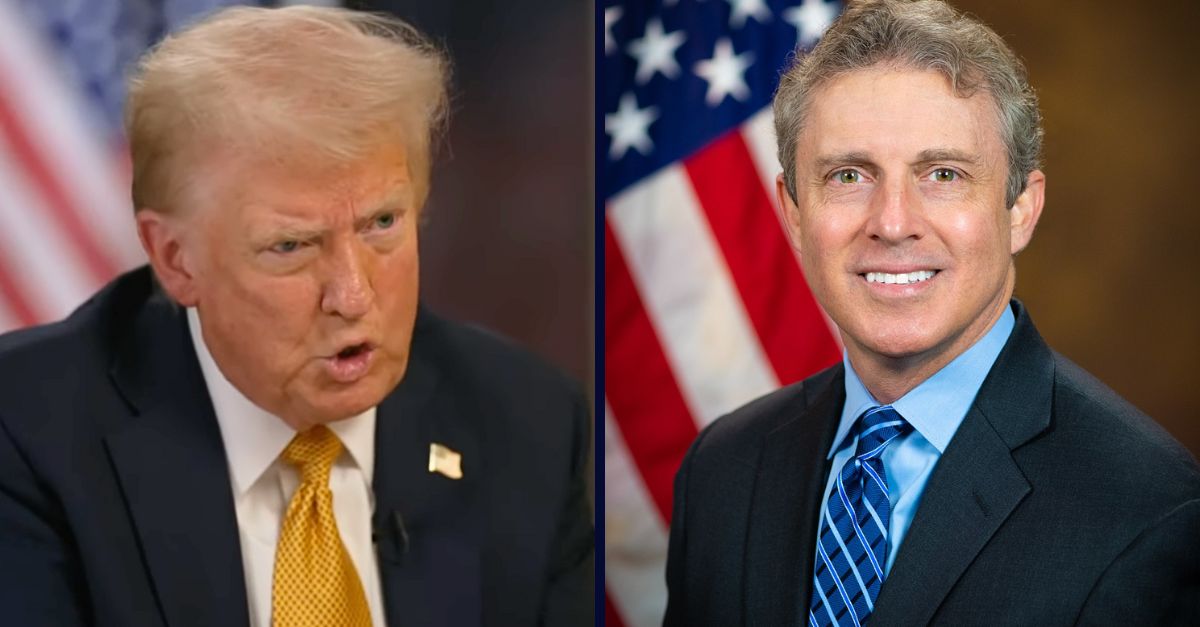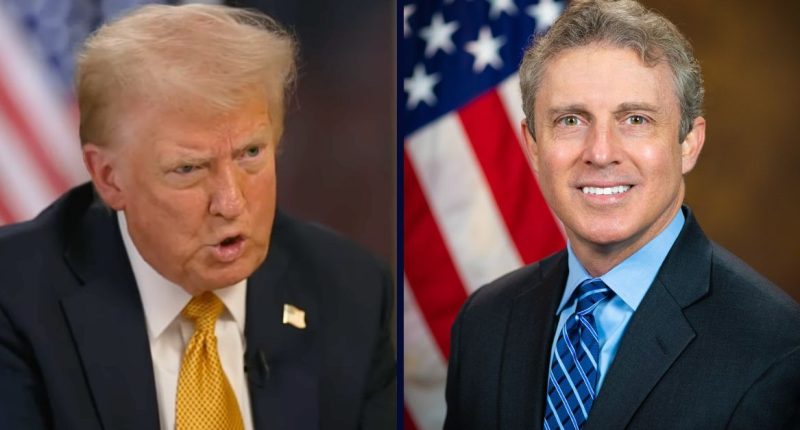
Left: President-elect Donald Trump on “Meet the Press” Sunday, Dec. 8, 2024 (NBC News/YouTube). Right: Hampton Dellinger (Office of Special Counsel).
The U.S. Court of Appeals for the D.C. Circuit is calling on booted-then-reinstated Biden ethics enforcer Hampton Dellinger to respond by Wednesday to a request that President Donald Trump‘s Justice Department made over the weekend, asking for a ruling by a federal judge in Washington — who deemed Dellinger’s firing unlawful — be tossed out before the DOJ takes the case up to the Supreme Court.
“This relief constitutes an extraordinary intrusion into the President’s authority,” wrote DOJ lawyers in a lower court motion to stay U.S. District Judge Amy Berman Jackson’s order, which was filed less than an hour after the ruling by the Barack Obama appointee in the District of Columbia. Jackson denied the motion to stay her order on Monday afternoon.
“Accordingly, Defendants have now appealed the Court’s order and intend to request a stay pending appeal from the United States Court of Appeals for the D.C. Circuit,” the DOJ lawyers said. “Out of an abundance of caution to ensure compliance with Federal Rule of Appellate Procedure, Defendants respectfully move the Court to stay its order pending appeal.”
In the emergency motion filed with the appellate court in D.C. on Saturday, the DOJ claimed Dellinger has been “prosecuting complaints on behalf of terminated federal employees and seeking stays of their terminations” after being reinstated by Jackson last month. Just days after Jackson issued a temporary restraining order reinstating him as special counsel, Dellinger allegedly launched an OSC probe into the firings of six federal workers by Trump. Dellinger conducted the investigation and then filed a petition with the Merit Systems Protection Board last Friday to reverse the removals. Dellinger, fired in January, was given his first TRO lifeline by Jackson on Feb. 12; his office reportedly announced the OSC probe on Feb. 14.
“The Court should immediately stay the district court’s order and put an end to Dellinger’s rogue use of executive authority over the President’s objection,” the DOJ said in its emergency appeals court motion. “Two prior appeals of orders countermanding Dellinger’s removal — first an ‘administrative stay,’ then a ‘temporary restraining order’ — were dismissed for lack of appellate jurisdiction. Now, this Court can indisputably reach the merits. Despite the district court’s characterization of its order as ‘extremely narrow,’ it gravely offends the separation of powers.”
On Monday, the D.C. Circuit requested that Dellinger respond by noon Wednesday, saying: “Upon consideration of the emergency motion for a stay pending appeal, which includes a request for an administrative stay, it is ordered that appellee file a response to the emergency motion.”
Dellinger, who was appointed by Joe Biden in 2024 to lead the Office of Special Counsel and enforce whistleblower laws, filed a lawsuit on Feb. 10 in the District of Columbia after being axed by Trump “in a one-sentence email,” according to his federal complaint.
On Saturday, Judge Jackson ruled that Dellinger’s termination from the Office of Special Counsel by Trump after he took office in January was both illegal and unprecedented. Jackson ruled in favor of letting Dellinger keep his job after listening to arguments from both sides at multiple hearings over the past month as part of the ongoing TRO battle. Her ruling Saturday sets the stage for a critical Supreme Court showdown as the DOJ has already fired off in an application to the nation’s highest court after multiple failed attempts to get Jackson’s TRO tossed last month, including an unsuccessful bid in the appeals court.
Trump’s DOJ has insisted that Article II of the Constitution gives the president the power to fire Dellinger because it “precludes Congress from placing limits on the President’s authority to remove principal officers of the United States who serve as sole heads of an Executive Branch agency.”
In its failed district court motion to stay Jackson’s order, DOJ lawyers said they believed they were “likely to succeed on the merits” of its claims if the Dellinger case is heard by the Supreme Court — and used a previous firing by President Joe Biden to emphasize their point.
“The Supreme Court has made clear — twice, and recently — that Article II precludes Congress from placing limits on the President’s authority to remove principal officers of the United States who serve as sole heads of an Executive Branch agency,” the motion said. “On that basis, President Biden in 2021 fired the single head of the Social Security Administration without cause. In removing Plaintiff as the head of OSC, another Executive Branch agency with a single head, the President merely exercised the same authority that President Biden did in removing the Social Security Commissioner and that the Supreme Court recognized as lawful in Seila Law and Collins.”
According to the DOJ, an injunction preventing the president from firing an agency head is “virtually unheard of” and is an attempt to “control” how Trump performs his official duties as commander-in-chief. “The relief entered by this Court ‘necessarily targets the president — the only official with the statutory and constitutional authority to appoint, remove, and supervise the Special Counsel,”” the district court motion said.
In their filing to the appeals court, Trump’s DOJ repeated that the Supreme Court has “repeatedly held that Article II empowers the President to remove at will the sole heads of executive agencies.” DOJ lawyers pointed to precedent and Article II in both motions to stay Jackson’s order.
“Plaintiff has identified no prior case in American history where a court has forced the President to retain the sole head of an agency after the President has determined that that person should not be entrusted with executive power,” the appeals court motion said. “Indeed, it is well established that courts lack equitable power to ‘restrain an executive officer from making a … removal of a subordinate appointee.’”
The DOJ has tried arguing that Dellinger was removed from office because he’s “wielding executive power” and has rulemaking authority that gives him the ability to punish the Trump administration and people in the executive branch. Jackson has, instead, referred to it as “rule-reading authority” — agreeing with arguments from Dellinger’s lawyers who said he could only conduct probes and make suggestions.
“The Office of Special Counsel is not assigned responsibilities that include furthering the administration’s agenda,” Jackson said Saturday in her ruling. “It is the Special Counsel’s job to look into and shine light on a set of specific prohibited practices so that the other bodies, in the appropriate exercise of their constitutional authority, can take whatever action they deem to be appropriate. To do this as Congress intended that he should, he must remain entirely free of partisan or political influence, and that is why the statute survives scrutiny even under the most recent precedent.”
According to Jackson, a review of the “statutory provisions” setting out the powers and functions of the Office of Special Counsel and the “history of the legislation” establishing its position and terms “reveals that his independence is inextricably intertwined with the performance of his duties,” per her ruling.
“The Special Counsel’s job is to look into and expose unethical or unlawful practices directed at federal civil servants, and to help ensure that whistleblowers who disclose fraud, waste, and abuse on the part of government agencies can do so without suffering reprisals,” Jackson explained. “It would be ironic, to say the least, and inimical to the ends furthered by the statute if the Special Counsel himself could be chilled in his work by fear of arbitrary or partisan removal.”
Love true crime? Sign up for our newsletter, The Law&Crime Docket, to get the latest real-life crime stories delivered right to your inbox.





